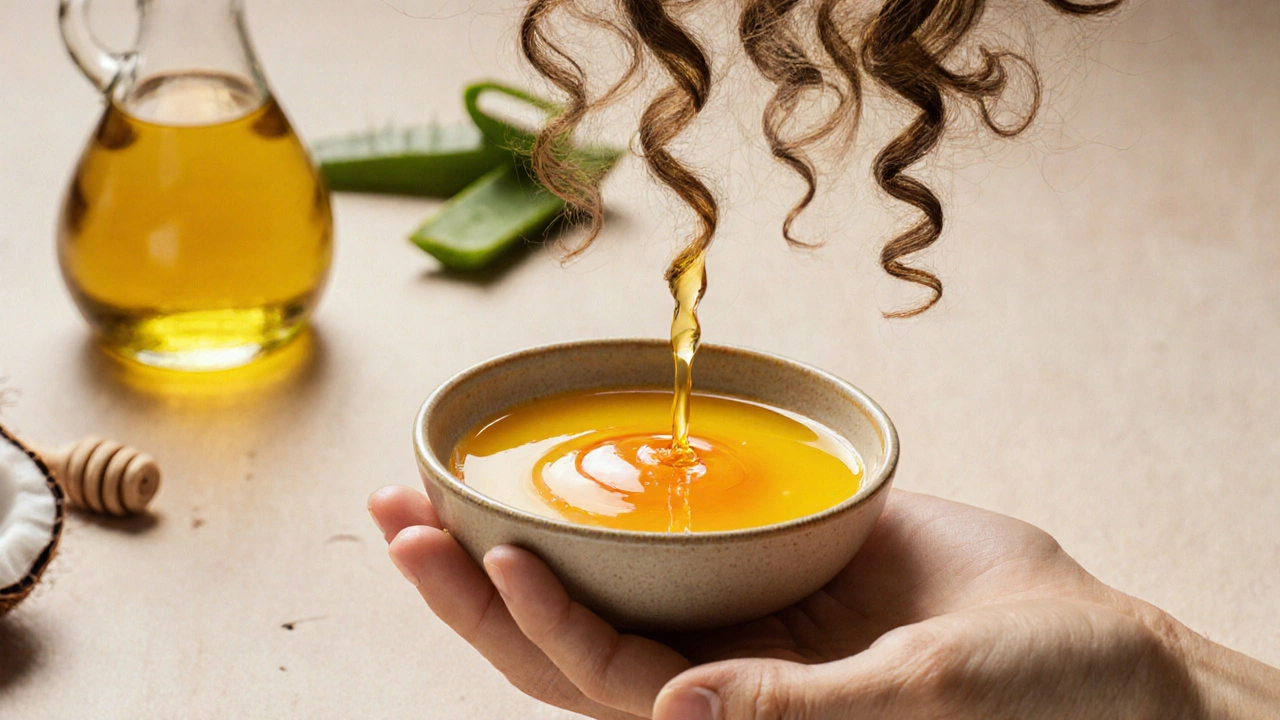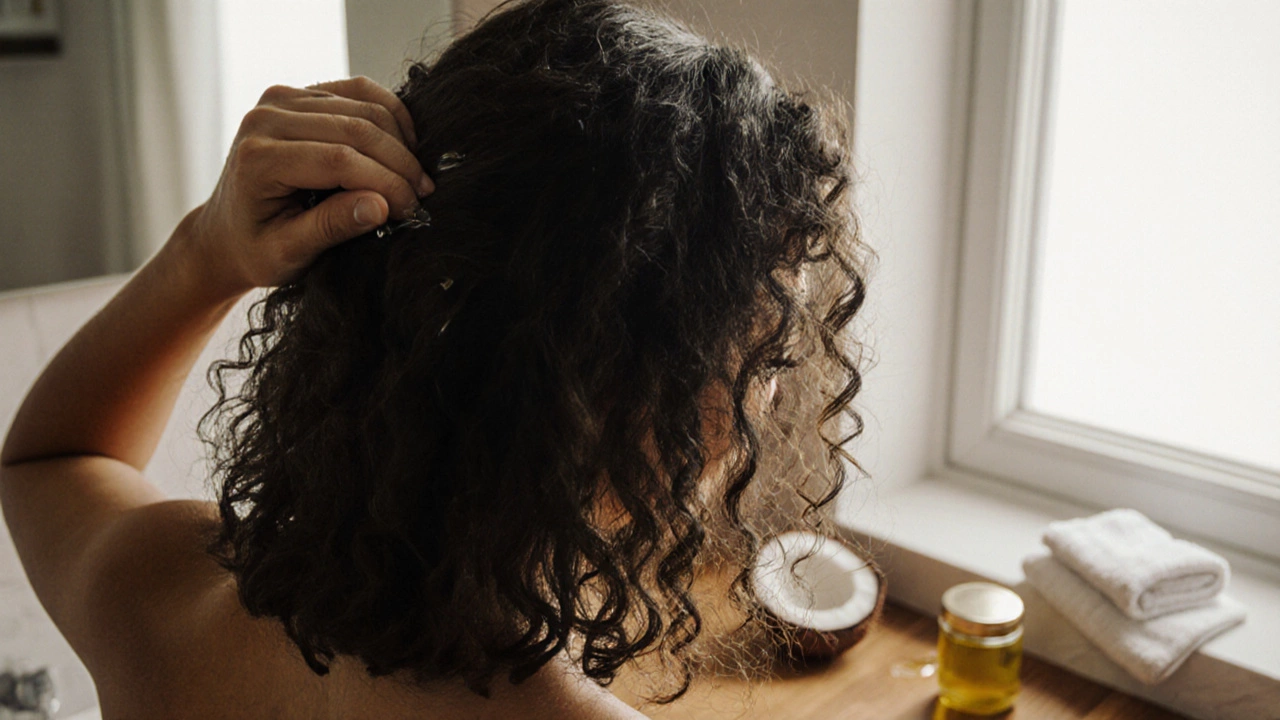Natural Hair Treatment Selector
Find the best natural treatment for your hair concerns. Select your primary issue and hair type to get personalized recommendations based on scientific research and traditional use.
Your Personalized Recommendation
If you’ve ever stared at your shampoo shelf wondering why your hair still feels dry, brittle, or frizzy-despite all the fancy products-you’re not alone. The truth is, your hair doesn’t need a chemistry lab to thrive. For centuries, people have used simple, natural things straight from the kitchen or garden to repair, nourish, and protect their hair. And science is now catching up. The best natural thing to put in your hair isn’t one single ingredient-it’s the right one for your hair type, texture, and problem.
Coconut Oil: The Deep Moisturizer
Coconut oil is the most researched natural hair treatment out there. A 2003 study published in the Journal of Cosmetic Science found that coconut oil penetrates the hair shaft better than mineral oil or sunflower oil. That’s because its small molecular structure lets it slip inside the hair strand, not just sit on top like most conditioners.
If your hair feels straw-like after washing, or if you notice split ends after brushing, coconut oil can help. Warm a tablespoon of virgin coconut oil in your hands and work it through damp hair, focusing on the mid-lengths to ends. Leave it on for at least 30 minutes-or overnight if you can. Wash it out with a gentle shampoo. Do this once a week, and you’ll notice less breakage and more shine within a few weeks.
But don’t use it if your hair is fine or oily. Coconut oil can weigh down thin strands or make greasy scalps worse. It’s best for medium to thick, dry, or curly hair.
Aloe Vera: The Soothing Scalp Healer
Most people think of aloe vera for sunburns. But the clear gel inside the leaves is just as powerful for your scalp. It’s packed with enzymes that gently remove dead skin cells, vitamins that strengthen hair follicles, and amino acids that help hair retain moisture.
If you have dandruff, itching, or flaking, aloe vera can calm inflammation without harsh chemicals. Cut open a fresh aloe leaf, scoop out the gel, and massage it directly onto your scalp. Leave it on for 20 minutes, then rinse with cool water. You can mix it with a little honey or apple cider vinegar for extra conditioning.
Unlike oils, aloe doesn’t leave residue. It’s safe for daily use-even on fine hair. People with sensitive scalps or eczema often report fewer flare-ups after switching to aloe-based treatments.
Olive Oil: The Protein Protector
Think of olive oil as your hair’s protein shield. It’s rich in oleic acid and antioxidants like vitamin E, which help seal in moisture and protect against environmental damage. Unlike coconut oil, olive oil doesn’t penetrate deeply-it coats the hair shaft, forming a protective barrier.
This makes it ideal for hair that’s been chemically treated-colored, permed, or relaxed. If your hair feels porous or frizzy after heat styling, olive oil helps smooth the cuticle and reduce frizz.
Warm two tablespoons of extra virgin olive oil and apply from roots to tips. Cover your head with a warm towel for 20 minutes. Rinse thoroughly. Use every 10-14 days. It’s heavier than coconut oil, so skip it if your hair is naturally oily or very fine.
Eggs: The Protein Powerhouse
Your hair is made of keratin-a protein. When your hair loses protein (from heat, coloring, or sun exposure), it gets weak and snaps easily. Eggs are one of the most concentrated natural sources of protein and biotin, which supports hair growth.
Whisk one whole egg (or just the yolk if your hair is oily) and mix it with a tablespoon of honey or olive oil. Apply to clean, damp hair. Leave it on for 20 minutes. Rinse with cool water-hot water will cook the egg and leave chunks in your hair.
Use this mask once a week for two months. Many people report thicker-looking hair and less shedding. It’s especially helpful for those with curly or textured hair that tends to lose elasticity.

Honey: The Humectant Hero
Honey doesn’t just sweeten your tea-it locks moisture into your hair. It’s a natural humectant, meaning it pulls water from the air into your strands. That’s why it’s so effective in dry climates or during winter months.
Raw, unfiltered honey is best. Mix one tablespoon with two tablespoons of warm water to thin it out. Add it to your conditioner, or use it alone as a rinse after washing. Leave it on for 10 minutes, then rinse.
Honey also has antibacterial properties. If you’ve got scalp acne or mild fungal issues, a honey rinse can help reduce irritation. It’s gentle enough for kids and safe for color-treated hair.
Apple Cider Vinegar: The Clarifying Rinse
Wondering why your hair looks dull even after deep conditioning? Buildup from products, hard water minerals, or sweat can coat your strands and block moisture. Apple cider vinegar (ACV) dissolves that buildup without stripping natural oils.
Dilute one part raw, unfiltered ACV with three parts cool water. After shampooing, pour it over your hair as a final rinse. Don’t wash it out. Let it sit for a minute, then rinse with cool water. Your hair will feel squeaky clean and look shinier immediately.
Use this once every 1-2 weeks. Too much can dry out your scalp, so don’t overdo it. People with curly hair swear by ACV rinses for definition and reduced frizz.
Which One Is Best for You?
There’s no universal winner. The best natural thing for your hair depends on what you’re trying to fix.
- Dry, brittle hair? Coconut oil or olive oil
- Itchy, flaky scalp? Aloe vera or honey
- Weak, thinning strands? Egg mask
- Dull, buildup-heavy hair? Apple cider vinegar rinse
- Frizzy, curly hair? Aloe vera + honey combo
Try one treatment at a time. Give it three weeks. If you don’t see improvement, switch. Your hair changes with the seasons, your diet, and your stress levels-so your routine should too.

What to Avoid
Not every natural thing is safe. Some common myths can hurt your hair:
- Raw lemon juice can bleach your hair and irritate your scalp-avoid it unless you’re intentionally lightening.
- Essential oils like tea tree or peppermint must be diluted. Never apply them straight-they can burn your scalp.
- Mayonnaise sounds like a good conditioner, but it’s full of soybean oil and preservatives that can clog pores.
- Castor oil is thick and sticky. It’s great for eyebrows or eyelashes, but can weigh down scalp hair and cause buildup.
Real Results, No Hype
You won’t see overnight miracles. But in 4-6 weeks, consistent use of the right natural treatment will show up in your mirror: less breakage, more shine, smoother texture, and a healthier scalp. You’ll also save money-most of these ingredients cost less than $5 a bottle and last for months.
And here’s the best part: you’ll stop wondering what’s in your hair. You’ll know exactly what you’re putting on it. No sulfates. No parabens. No mystery chemicals. Just real food, real plants, and real results.
Can I mix natural ingredients together for a hair mask?
Yes, but be careful. You can combine honey and aloe vera for moisture, or coconut oil and egg for protein and hydration. Avoid mixing acidic ingredients like apple cider vinegar with protein masks like eggs-this can make your hair stiff. Always patch-test new combinations on a small section first.
How often should I use natural hair treatments?
Once a week is safe for most treatments. Oil masks can go every 7-10 days. Aloe vera and honey rinses can be used 2-3 times a week. Apple cider vinegar should be limited to once every 1-2 weeks to avoid dryness. Listen to your hair-if it feels greasy or weighed down, cut back.
Do natural treatments work for all hair types?
Yes, but not all ingredients suit all types. Fine hair does better with light treatments like aloe vera and honey. Thick, curly, or coarse hair can handle heavier oils like coconut or olive. If your hair is oily, avoid oils altogether and focus on clarifying rinses and aloe. Always match the treatment to your hair’s texture and scalp condition.
Will natural treatments help my hair grow faster?
They won’t magically make your hair grow faster, but they can help it grow longer by reducing breakage. Healthy hair that doesn’t snap off will appear longer over time. Treatments like egg masks and aloe vera support scalp health, which is the foundation for growth. For actual growth speed, genetics and diet play the biggest roles.
Can I leave natural treatments in my hair overnight?
Yes, but only with oils like coconut or olive. Wrap your hair in a silk scarf or old T-shirt to protect your pillow. Don’t leave egg or honey masks on overnight-they can ferment, attract bugs, or make your scalp itchy. Stick to 20-30 minutes for those.
Next Steps
Start simple. Pick one natural treatment that matches your biggest hair concern. Try it for three weeks. Keep notes: how your hair felt, looked, and behaved after each use. If it works, make it part of your routine. If not, try another.
Once you find what works, you’ll stop spending money on products that promise miracles but deliver nothing. You’ll start trusting your hair again-not the label on a bottle, but the way it feels when it’s truly nourished.

